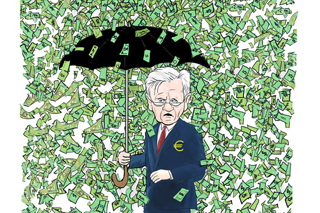In een paar weken tijd nam kunstmatige intelligentie de wereld over op een ongekende manier. Met de lancering van ChatGPT door OpenAI in november


Will Quantitative easing or helicopter money help the European economy?
Sylvester Eijffinger sheds his light on the quantitative easing project of the ECB. He talks about a possible stock market bubble, good and bad deflation and trust in the economy.
In the last month of 2014 we saw the first case of a negative inflation rate, 0.2 percent in the euro zone. Immediately, many (central) bankers, economists and politicians pointed to the risk of deflation in the Eurozone. Deflation is not a single negative inflation, but a process of continuous decline in prices, which are embedded in expectations and wages. Inflation in the Eurozone is indeed historically very low, but that is mainly due to falling oil prices which in turn could stimulate economic growth. Some economists call that “good deflation.” It is dangerous to continuously highlight the dangers of deflation, because a self-fulfilling prophecy could occur. As long as consumers and producers hear the term ‘deflation’, long and often enough they might eventually go on believing it.
It is noteworthy that the discussion about deflation is politicized between proponents of buying up government bonds, such as President Mario Draghi of the European Central Bank (ECB), and opponents such as Bundesbank president Jens Weidmann and Klaas Knot president of the Dutch central bank. It has now been several months since Draghi pushed his will through the Governing Council of the ECB, citing the threat of deflation. According to many experts, this threat is gone now and is a thing of the past, just as I and others have predicted.
The ECB has started their quantitative easing program (or simply QE) in March 2015 with the purchase of government bonds worth 60 billion per month for a period of eighteen months, while the economies in the Eurozone – except Greece – have already shown the first signs of recovery. According to the European Court of Justice, it is allowed under the treaty if certain conditions are met, but the question remains whether this is a wise decision. Buying up government bonds of weak euro countries – such as France and Italy – will remove the pressure to implement structural reforms in these countries. There is more than enough liquidity in the Eurozone.
The problem is however that liquidity does not go into the real economy. The monetary transmission process has not functioned for years. That does not keep some economists from proposing even wilder ideas to boost the economy, such as the spreading of “helicopter money”. This idea comes from the former Chairman of the Federal Reserve; Ben Bernanke (FED), who acquired the nickname “Helicopter Ben.” Will helicopter money – handing out free money to anyone – even work? The answer is no! One can bring the horse to the stream, but it cannot force it to drink (Milton Friedman).
There is excess liquidity in the Eurozone, but consumers and producers in the weak euro countries refuse to spend or invest it as long as there is no trust in the economy. Such confidence can only return if the weak euro countries finally put things in order. What’s happening now is that the excess liquidity increases further in the Eurozone, which will result in a further decline and even negative (nominal) interest rates. The shares listed on the Amsterdam stock exchange are extremely high, the AEX index went through the 500 point mark for the first time in seven years. The prices of listed stocks are relatively very high and this is mainly because of the extremely low or even negative interest rates. I am not surprised at all about the current level of the AEX index. The decision of the ECB to buy up 60 billion worth of government bonds and loans a month has a depressing effect on the already low short and long-term interest rates. The returns on savings are further reduced, pretty much forcing savers to invest in stocks. There is a speculative bubble being created, but this bubble still has a long time (up to 18 months) to continue growing. As long as the purchasing program of the ECB continues, individual investors will step into the stock market.
However, the longer the bubble, the greater the hit will be when it pops. I expect that a correction on the stock market will take place within the next year. The only question is whether this will occur at 500 or 600 points. The stock exchange is reminiscent of the alcoholic who has an ever greater need for alcohol. However, there comes a time when the alcoholic will have to quit. The longer it lasts, the harder it will be to quit the stock market. Or in the famous words of William McChesney Martin, another former Fed chairman: “It is our task to take the punch bowl away, when the party is still going.” Unfortunately ECB President Draghi wants to put more alcohol in the punch bowl the upcoming 18 months. Therefore, the QE-party of Draghi will eventually turn out to be an even greater disillusionment.
Source: https://goo.gl/0p1qqx (www.jalta.nl)






















